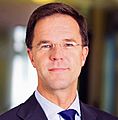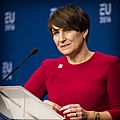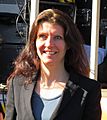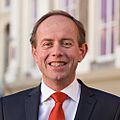Politics of the Netherlands facts for kids
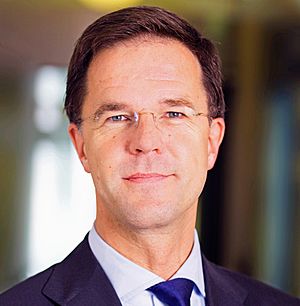
The politics of the Netherlands is how the country is governed. It's an indirect democracy, which means people vote for representatives who then make decisions for them. The Netherlands has a constitution, which is a set of rules for how the country works, and a monarchy with a king or queen whose power is limited by these rules.
The government is made up of a parliament (which makes laws) and a government (which carries out the laws). The government needs the parliament's support to stay in power.
The parliament is called the States General. It has two parts:
- The Second Chamber (Tweede Kamer) is like the House of Representatives in other countries.
- The First Chamber (Eerste Kamer) is similar to a Senate.
Below the national level, there are provinces, municipalities, and water boards, which manage local areas and water.
The Netherlands is also part of bigger groups like the European Union (EU), NATO, and the United Nations (UN).
Officially, the country is called the Kingdom of the Netherlands. It includes the European part of the Netherlands and three islands in the Caribbean: Aruba, Curaçao, and Saint Martin. Three other Caribbean islands are special municipalities of the Netherlands, known as the Caribbean Netherlands.
Contents
How the Dutch Government Works
The current government is called the Third Rutte cabinet. It's a team formed by several political parties working together. These parties are:
- The People's Party for Freedom and Democracy (VVD)
- The Christian Democratic Appeal (CDA)
- Democrats 66 (D66)
- The ChristianUnion (CU)
This government started on October 26, 2017. The Prime Minister, who leads the government, is Mark Rutte from the VVD party. He has been Prime Minister since 2010.
Main Political Parties
Here are some of the main political parties that have members in the Dutch parliament:
- 50+ (50PLUS): This party focuses on helping older people.
- CDA (Christian Democratic Appeal): A Christian democratic party. Former Prime Minister Jan Peter Balkenende was a member of this party.
- CU (ChristianUnion): An orthodox Christian democratic party.
- D66 (Democrats 66): A social liberal party that was started in 1966.
- DENK (DENK): This party aims to represent non-Western citizens.
- FvD (Forum for Democracy): A party that often questions how politics is currently run.
- GL (GreenLeft): A left-wing party that cares a lot about the environment.
- OSF (Independent Senate Group): This group brings together different local parties, like the Frisian National Party.
- PvdA (Labour Party): A social democratic party.
- PvdD (Party for the Animals): This party works for animal rights and against global warming.
- PVV (Party for Freedom): A populist party started by Geert Wilders.
- SGP (Reformed Political Party): A conservative Calvinist party.
- SP (Socialist Party): A socialist party.
- VVD (People's Party for Freedom and Democracy): A conservative liberal party. The current Prime Minister, Mark Rutte, is a member of the VVD.
Important Political Leaders
Here are some of the political leaders in the Netherlands since 2021, listed by how many seats their party has in parliament.
-
Geert Wilders -
Party for Freedom (PVV) -
Wopke Hoekstra -
Christian Democratic Appeal (CDA) -
Sigrid Kaag -
Democrats 66 (D66) -
Jesse Klaver -
GreenLeft (GL) -
Lilianne Ploumen -
Labour Party (PvdA) -
Gert-Jan Segers -
ChristianUnion (CU) -
Farid Azarkan -
DENK -
Thierry Baudet -
Forum for Democracy (FvD)
Related pages
See also
 In Spanish: Gobierno y política de los Países Bajos para niños
In Spanish: Gobierno y política de los Países Bajos para niños
 | Percy Lavon Julian |
 | Katherine Johnson |
 | George Washington Carver |
 | Annie Easley |


